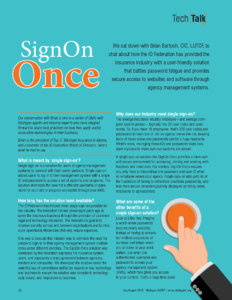Michigan Agent magazine interviewed Brian Bartosh, president of Top O’ Michigan Insurance in Alpena, and a member of the ID Federation board of directors. Following are excerpts from that interview in the August 2018 issue.
What are some of the other benefits of a single sign-on solution?
“Look at it like this: Imagine a world where passwords become nearly obsolete. Instead of having to remember endless sequences of numbers and letters when you sit down at your work station, you enter one authenticated username and password to access your agency management system (AMS), which then gives you access to your carriers. That’s a huge time saver that translates into more time attending to your clients rather than talking to IT.
“Increased security is an enormous benefit. Lots of software is built to remember the user codes and  passwords you enter — which can put you in a vulnerable position. Also, people overwhelmed by passwords sometimes devise incredibly simple passwords that are easy to hack. For instance, the most common password used today is simply the word ‘PASSWORD.’ Some people, too, keep passwords in places where others can see them, or even on a company spreadsheet viewed by multiple people – making identities easy to steal.”
passwords you enter — which can put you in a vulnerable position. Also, people overwhelmed by passwords sometimes devise incredibly simple passwords that are easy to hack. For instance, the most common password used today is simply the word ‘PASSWORD.’ Some people, too, keep passwords in places where others can see them, or even on a company spreadsheet viewed by multiple people – making identities easy to steal.”
The average insurance industry employee — and average computer user in general — typically has 32 user codes and passwords. So if you have 10 employees, that’s 320 user codes and passwords to take care of.”
What’s your advice for getting started? For getting staff buy-in?
“SignOn Once is an agreement your agency can easily set up with the ID Federation. At Top O’ Michigan Insurance, we’re in the midst of adopting single sign-on for use by our staff and agents. Our AMS vendor will coordinate and assign IDs to the carriers and companies we work with, then set us up to use the SignOn Once solution. It’s seamless, and there’s no cost involved.
“… Essentially, with SignOn Once, there’s nothing for you to build and there’s nothing for you to learn. Staff and users of your agency management system won’t notice anything different — except for the disappearance of countless user codes and passwords, and the increased efficiencies of a secure, streamlined system.”
To read the entire article, click here.